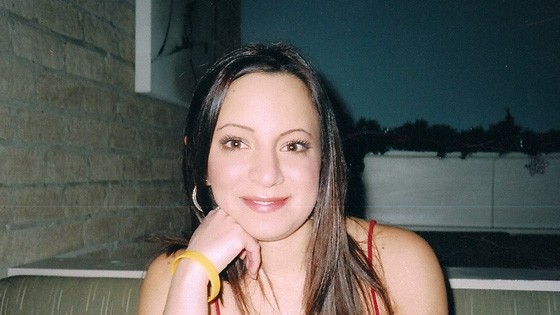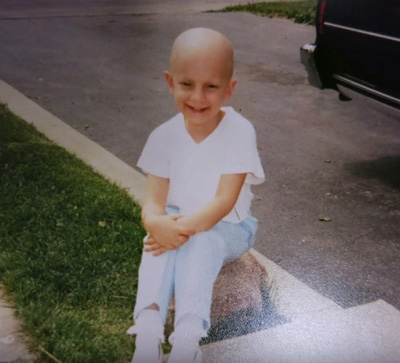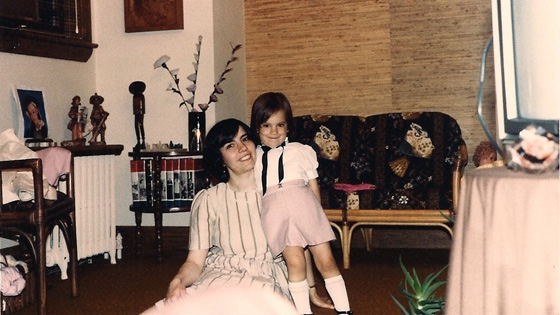Sabrina Fuoco’s cancer journey begins at the age of three. Her mother, Marcella Fuoco, noticed a small bump on her neck. (Photo: Sabrina Fuoco)
My name is Sabrina Fuoco and I am a five-time cancer survivor. I am 34 and have been battling this gruelling illness for 31 years: as a child, teenager and young adult. Over the years, cancer has taken my health, my hair, my energy, chunks of my body and sometimes even my sanity – but it has also given me a gift – to live life meaningfully and with great urgency. Not knowing whether I have months or years to live has forced me to live life in the moment and enjoy the present.
This is my open letter to cancer.
This is where my story begins.
Dear cancer,
My dad was driving us to a relative's house for dinner when my mom first noticed you – a small bump the size of a walnut on my neck.
It was 1984. I was three.
After a week of taking antibiotics, I went to The Hospital for Sick Children (SickKids) for a biopsy. I was diagnosed with rhabdomyosarcoma, a rare form of cancer most commonly seen in children ages one to five years old.
While most kids my age were playing with puzzles and trying to colour inside the lines, I started chemotherapy in an attempt to shrink my tumour. When this didn't work, I underwent surgery to remove it.
By 1986, following surgery, I had undergone two years of chemotherapy at SickKids and 23 radiation treatments at Princess Margaret Cancer Centre. I was five years old.
Related to this story:

Today, Sabrina is 34 years old. (Photo: Sabrina Fuoco)
'The scary tube'
Butterfly needles, CT scans, a playroom, and nurses and doctors who worked tirelessly to save my life – these are my first memories as a child.
I was terrified of CT scans – "the tube" as I called it – and admittedly, I'm not a big fan of them today either. I can still see the face of my favourite nurse, Pat, who would hold my hand as I went into the scary tube and received a big needle. She would reassure me that it would hurt for a second and then everything would be okay. She was right.
But I didn't understand the gravity of my disease.
I was constantly in and out of the hospital, whether it was for treatments, scans, blood work, infections, or surgeries. Being "sick" was normal to me.

Sabrina remembers "looking different than the other kids" when she started school. (Photo: Sabrina Fuoco)
Ponytails and long locks
As a little girl, I loved wearing white patent leather shoes, skirts, stockings, and tops with bows or ruffles. And I loved the fact that I was going to be growing my hair.
I can recall my parents telling me I was very sick and the medication was going to make me lose my hair. But I didn't appreciate the consequences until it actually started to fall out.
I felt so embarrassed when I started school. I looked different than the other kids, especially the other little girls with their ponytails and long locks. I was bald and had mobility issues with my neck.
I didn't feel as though I belonged.
I felt more comfortable being at the hospital than I did in the "real world." At least in the hospital I was surrounded by other children like me. At such a young age, I had learned the importance of belonging to a community.

Sabrina's cancer diagnosis impacted everyone involved – including her parents, close relatives and friends. (Photo: Sabrina Fuoco)
The toll of cancer on mom and dad
Although it was my three-year-old body that had to physically endure the harsh treatments, my parents and close relatives had to accept the trauma associated with watching their sick child. It was a diagnosis for everyone involved – especially my parents.
Eating was one of the biggest challenges. After 23 radiation treatments, my throat was badly burned and scarred.
I was unable to swallow food properly. My mom was tasked with the difficult job of making sure I was eating. I was already underweight due to the treatments and nausea associated with the chemotherapy, and I needed nutrients to build up my strength and immunity again.
So my mother had to force feed me – and this broke her heart. As I screamed and cried in pain, my mother had to be strong for both of us.
But little did I know the late-term effects of a childhood cancer diagnosis would haunt me for years to come.
My oncologist cautioned me and my parents that there was a chance of recurrence within an eight-year window – but after that, the odds of being diagnosed would be the same as anyone else.
So you can imagine my surprise 15 years later, as I prepared to graduate from high school at the age of 18, that you – cancer
– struck again.
Until next time,
Sabrina
Sabrina Fuoco is a patient in the Adolescent and Young Adult (AYA) Program at Princess Margaret Cancer Centre. Tune in for part two of Sabrina's Cancer Diary next week.
